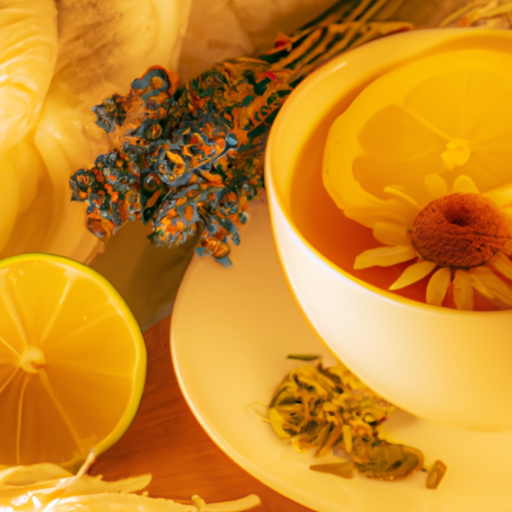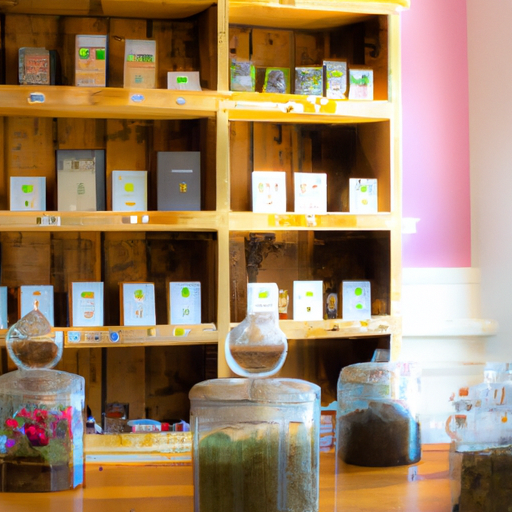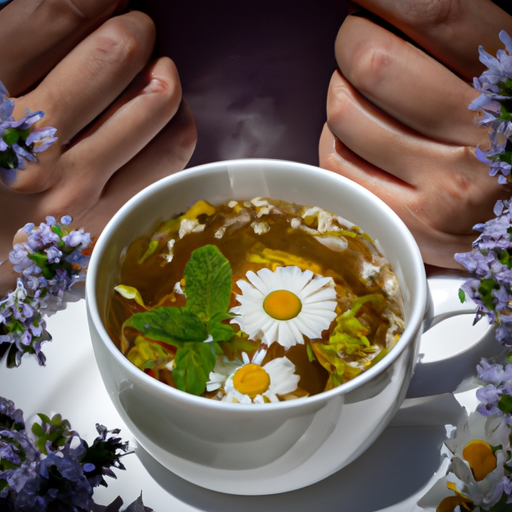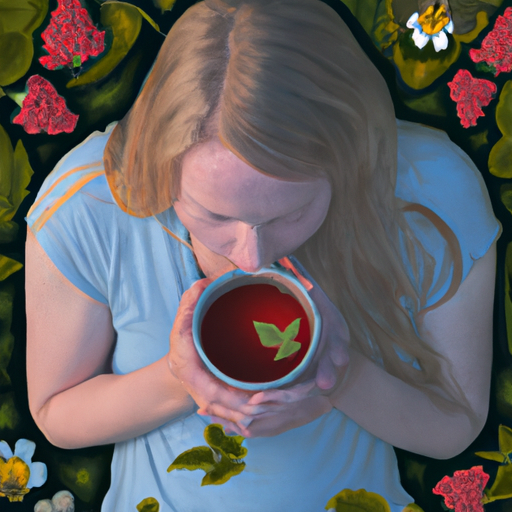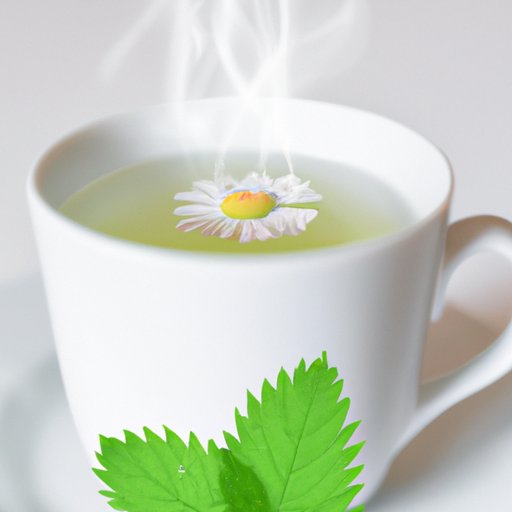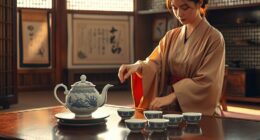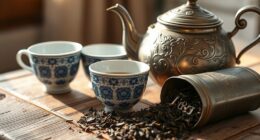Herbal tea, a calming and fragrant drink, is often praised for its many health advantages. Like a soft wind, it has the ability to relax both the body and mind. Nonetheless, not all herbal teas are made the same, so it is crucial to recognize specific ingredients that should be avoided.
Just as a skilled gardener carefully selects and nurtures their plants, we too must be mindful of what we consume. In this article, I will guide you through the jungle of herbal teas and shed light on ingredients that should raise a cautionary flag.
From artificial sweeteners that can disrupt our natural balance to pesticide residues that linger in our cups, we will explore the potential pitfalls of herbal tea. Additionally, we will delve into allergenic herbs, medicinal interactions, and the importance of quality and sourcing.
By arming ourselves with knowledge, we can make informed choices and savor the benefits of herbal tea without any bitter aftertaste.
Key Takeaways
- Artificial sweeteners like aspartame and sucralose should be avoided in herbal tea.
- Caffeine in herbal tea can disrupt sleep patterns and increase anxiety levels.
- Added flavors in herbal teas are often artificial and can mask the taste of low-quality herbs.
- Herbal teas containing chamomile, lavender, and lemon balm can promote relaxation, reduce anxiety, and improve sleep quality.
Artificial Sweeteners
Avoid artificial sweeteners like aspartame or sucralose in your herbal tea, as they can have negative effects on your health. While these sweeteners may provide a low-calorie option, they aren’t natural alternatives and can potentially lead to various health issues.
Herbal tea, on the other hand, offers numerous health benefits. It’s rich in antioxidants and can boost your immune system, improve digestion, and promote relaxation. By choosing natural sweeteners like honey or stevia, you can enhance the taste of your herbal tea without compromising your health.
Now, let’s move on to the next important ingredient to watch out for in your herbal tea: caffeine.
Caffeine
Caffeine, a stimulant found in various beverages including herbal tea, can have significant effects on sleep and anxiety levels. Consuming caffeine, especially in the evening, can disrupt sleep patterns and lead to difficulty falling asleep or staying asleep throughout the night.
However, there are herbal teas available that are naturally caffeine-free, providing a soothing and relaxing option for those looking to avoid the stimulating effects of caffeine.
Effects on sleep and anxiety
Discover how certain ingredients in herbal tea can actually promote a restful night’s sleep and help alleviate feelings of anxiety. When it comes to effects on mood, herbal teas containing ingredients like chamomile, lavender, and lemon balm have been shown to have a calming effect on the mind and body. These herbs contain compounds that interact with receptors in the brain, promoting relaxation and reducing feelings of anxiety. Additionally, long-term use of herbal teas with these ingredients has been associated with improved sleep quality and reduced symptoms of insomnia. To further illustrate the benefits of these ingredients, consider the following table:
| Herbal Tea Ingredient | Effects on Sleep | Effects on Anxiety |
|---|---|---|
| Chamomile | Promotes deep sleep | Reduces anxiety symptoms |
| Lavender | Improves sleep quality | Calms the mind |
| Lemon Balm | Reduces insomnia symptoms | Relieves feelings of anxiety |
By incorporating herbal teas without caffeine into your routine, you can enjoy the benefits of improved sleep and reduced anxiety without the stimulating effects of caffeine.
Herbal teas without caffeine
To enhance your sleep quality and reduce anxiety, try incorporating caffeine-free herbal infusions into your daily routine. There are plenty of caffeine-free herbal tea options available that can provide numerous benefits for relaxation.
Chamomile tea, for example, is well-known for its calming properties and can help improve sleep quality. Another great option is lavender tea, which has been shown to reduce anxiety and promote a sense of calm. Peppermint tea is also a popular choice, known for its soothing effects on the digestive system and its ability to relax the body and mind.
By choosing these caffeine-free herbal teas, you can enjoy a peaceful night’s sleep and reduce anxiety naturally.
In the next section, we’ll explore the added flavors you can find in herbal teas without compromising their benefits.
Added Flavors
Avoid those added flavors, they’re just disguising the taste of low-quality herbs and fooling you into thinking you’re sipping on something special. When it comes to herbal tea, the health benefits lie in the natural alternatives, not the artificial additives. Many herbal teas have their own unique flavors and aromas that can be enjoyed without the need for additional flavorings. To illustrate this, let’s take a look at a comparison between a herbal tea with added flavors and one without:
| Herbal Tea with Added Flavors | Herbal Tea without Added Flavors |
|---|---|
| Artificial strawberry flavor | Pure chamomile blossoms |
| Synthetic vanilla extract | Organic peppermint leaves |
| Chemical lemon essence | Fresh ginger root |
As you can see, the natural alternatives provide a more authentic and wholesome experience. Next, we’ll delve into the issue of pesticide residues, which can be present in some herbal teas, and discuss their potential impact on our health.
Pesticide Residues
Did you know that pesticide residues can potentially impact your health when it comes to the tea you’re drinking? It’s important to be aware of the potential risks associated with pesticide residues in herbal tea.
Choosing organic-certified herbal teas can help minimize exposure to these harmful chemicals. Organic certification ensures that the tea has been grown without the use of synthetic pesticides or fertilizers. By opting for organic herbal teas, you can enjoy the natural flavors and benefits of the herbs without worrying about pesticide residues.
Additionally, herbal teas are known for their detoxification benefits, helping to cleanse the body and support overall health.
Now let’s move on to the next section and discuss the potential risks of allergenic herbs.
Allergenic Herbs
Now that we’ve discussed the potential risks of pesticide residues in herbal tea, let’s shift our focus to another important consideration: allergenic herbs.
It’s crucial to be aware of the potential for cross reactivity and sensitization when consuming herbal tea, especially if you have known allergies or sensitivities. Some herbs, such as chamomile, echinacea, and peppermint, have been found to have cross reactivity risks with other allergens, like ragweed and birch pollen. This means that if you have allergies to these substances, you might also have a reaction to these herbs.
Additionally, some herbs themselves can cause sensitization, leading to allergic reactions over time. It’s important to be mindful of these risks and consult with a healthcare professional if you have any concerns.
With that in mind, let’s now delve into the next section about medicinal interactions.
Medicinal Interactions
Be cautious when consuming herbal tea, as it can interact with medications like a dance partner, potentially affecting their effectiveness or causing unwanted side effects. It’s important to be aware of the potential side effects of herbal teas and how they may interact with your medications.
Here are some key points to consider:
-
Certain herbs in herbal teas can interfere with medications, such as St. John’s Wort, which can reduce the effectiveness of antidepressants.
-
Always consult with your healthcare provider or pharmacist before consuming herbal teas if you’re taking medications.
-
Dosage recommendations for herbal teas may vary depending on the individual and their health conditions.
Understanding the potential interactions between herbal teas and medications is essential to ensure your safety and well-being.
Moving on to the next section about quality and sourcing, it’s equally important to consider the source and quality of the herbs used in herbal teas.
Quality and Sourcing
Ensure that you’re getting the best herbal tea experience by considering the quality and source of the herbs you select. When it comes to herbal tea, it’s essential to choose herbs that are sustainably sourced and have organic certification.
By selecting herbs that are sustainably sourced, you’re supporting practices that protect the environment and promote the long-term availability of these herbs. Look for herbal tea brands that prioritize sustainability practices, such as using eco-friendly packaging and supporting fair trade practices.
Additionally, choosing herbs with organic certification ensures that they’re free from pesticides, herbicides, and other harmful chemicals. This certification guarantees that the herbs are grown and processed in an environmentally friendly manner.
By paying attention to the quality and source of the herbs, you can enjoy herbal tea that’s both delicious and environmentally responsible.
Frequently Asked Questions
Are there any artificial sweeteners commonly used in herbal tea?
Oh, you betcha! Artificial sweeteners can be found in some herbal teas. However, they come with potential health risks. Studies suggest they may disrupt gut health and even contribute to weight gain. So, be cautious when sippin’ on that tea!
How much caffeine is typically found in herbal tea?
Herbal teas typically have little to no caffeine content, making them a great alternative to caffeinated beverages. They offer various health benefits, such as antioxidant properties and promoting relaxation.
Are added flavors commonly used in herbal tea and what are some examples?
Yes, added flavors are commonly used in herbal tea. For example, I once tried a chamomile tea with a hint of lavender. However, it’s important to be aware of potential health risks from artificial sweeteners.
Is it common for herbal tea to contain pesticide residues?
Pesticide residues in herbal tea can negatively impact human health and well-being, potentially causing various health issues. Regulations and industry practices ensure the absence of such residues through rigorous testing and monitoring processes.
Are there any herbs commonly used in herbal tea that may cause allergies in some individuals?
Some herbs commonly used in herbal tea may cause allergies in certain individuals. It is important to be aware of any potential interactions between herbal tea and medications, as well as the effects of herbal tea on sleep.
Conclusion
In conclusion, it’s crucial to be aware of the ingredients to avoid in herbal tea. Artificial sweeteners, such as aspartame, can have negative health effects. Caffeine, found in certain herbal teas like yerba mate, can disrupt sleep patterns. Added flavors may contain chemicals that can be harmful to the body.
Pesticide residues can be present in conventionally grown herbs, so opting for organic options is recommended. Allergenic herbs, like chamomile, can cause adverse reactions in some individuals. Lastly, it’s important to consider potential medicinal interactions and to ensure the quality and sourcing of the herbal tea.
For instance, a case study showed that a person taking blood thinners experienced increased bleeding when consuming large amounts of ginkgo biloba tea. It is essential to do thorough research and consult with a healthcare professional before incorporating herbal teas into your daily routine.


